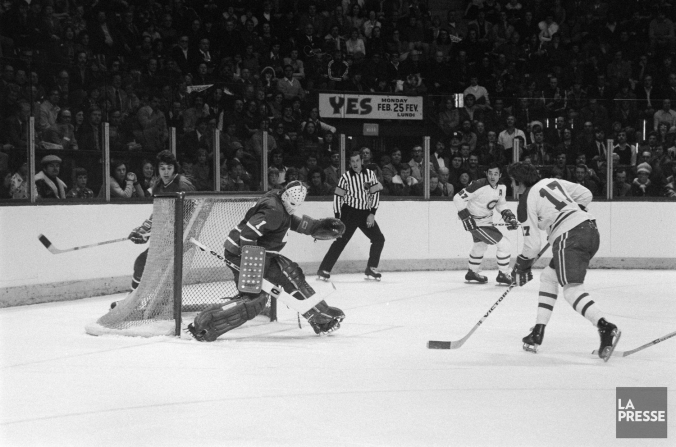
Eyes On The Tigers: The challengers from Calgary endure the Montreal snow in March of 1924. They are, in the back row, from left to right, Lloyd Turner (owner and coach), Rosie Helmer (trainer). Middle: Bobby Benson, Bernie Morris, Rusty Crawford, Charlie Reid, Herb Gardiner. Front: Ernie Anderson, Red Dutton, Cully Wilson, Harry Oliver, Eddie Oatman.
“Canadiens Now World Champions In All Reality,” the headline in the Montreal Daily Star read, and it was true, and real: a century ago, on a Tuesday of this date in 1924, the Montreal Canadiens did claim the club’s second Stanley Cup championship, their first of the NHL era. They did so with a potent roster that included Howie Morenz, Georges Vézina, and the Cleghorn brothers, Odie and Sprague.
Their opponents in the finals were the Calgary Tigers, champions of the WCHL, who iced an impressive line-up of their own. Owned and coached by Lloyd Turner, the team featured a defence anchored by Herb Gardiner, who’d soon enough end up a Canadien himself, and the redoubtable Red Dutton, the future (interim) president of the NHL. At forward they counted on Bernie Morris, the former Seattle Met who missed the foreshortened 1919 Stanley Cup finals due to having been jailed at Alcatraz by the U.S. Army for evading the draft, and Harry Oliver, who was destined for the Boston Bruins. They also counted on veterans Rusty Crawford, Cully Wilson, and Eddie Oatman, Cup-winners all. Spare defenceman Bobby Benson had won a gold medal at the 1920 Olympics as a member of the Winnipeg Falcons.

Cup Champions: The 1924 Canadiens lined up (from left) captain Sprague Cleghorn, Sylvio Mantha, Aurèle Joliat, Leo Dandurand (manager), Howie Morenz, Eddie Dufour (trainer), Billy Boucher, Billy Coutu, Odie Cleghorn, Georges Vézina. Malone retired midway through the season and didn’t participate in the playoffs or championship final; his name was not engraved on the Cup.
Canadiens finished second to the Ottawa Senators in the final NHL standings that year, but then beat Ottawa in a two-game series to move on. They next had to deal with the PCHA Vancouver Maroons, who featured Frank Boucher, Helge Bostrom, and Hughie Lehman in their line-up. Having beaten them in a two-game series in Montreal, the Canadiens went on to dispense with the Tigers in a two-game sweep, beating them 6-1 at the Mount Royal Arena on March 22 and then wrapping up the Cup with a 3-0 win three days later.
The decisive game was actually played in Ottawa, at the Auditorium, due to the softening of the ice in Montreal. Art Ross was the referee on the night, and Morenz distinguished himself by scoring the game’s winning goal. He also got into a bad collision with Red Dutton, which sent him to hospital in the second period with an injured chest and torn ligaments in his shoulder.
“We are naturally disappointed in losing out in the final series,” Turner said, “but we have no complaints to make. Canadiens have a fine team. We hope in time that we will gather together a team which will come down east and lift the Stanley Cup. We’ll do it eventually. We’re not going to lose heart because of the setbacks we have received.”

The Tigers caught a train headed west, though they got off in Winnipeg on the way home, stopping off to cheer on the junior Calgary Canadians as they played the Owen Sound Greys for the Memorial Cup. Like the Tigers, the Canadians fell at the finish, losing their two-game series to the team from Ontario.
The two vanquished teams stepped off the train in Calgary on the evening of Sunday, March 30, where they were met (as the Calgary Herald noted) “a great mass of enthusiastic sport fans who appeared in a highly excited mood.”
The Herald thought the Tigers should have beaten the Habs but allowed that the Montrealers were a game bunch who showed “indomitable spirit” in their victory. In the youngsters Morenz and Joliat, the western paper added, Canadiens had two rising stars. That’s not to say that the Herald didn’t have a finger to wag. Several fingers, actually:
While Morenz displayed a flashier style in dashing speed and clever stick-work, Joliat proved to the hockey world that he is a youth of wonderful hockey brain power, supported by a wealth of speed, clever stick play, and an accurate shot. He is the ideal looking hockey performer, probably a trifle too “cocky” and somewhat disposed to “grandstand” his stuff.
Morenz and Joliat are both too eager to create trouble with small, scrappy tactics that spoilt herm as finished products. It may be that this habit has grown on them in their ambitious spurt to prominence in Montreal hockey circles. Experience will modify their conduct, no doubt, and when purged of these habits they should blossom forth as great lights in the hockey orbit.
(Images, top and bottom: Courtesy of Libraries and Cultural Resources Digital Collections, University of Calgary)













